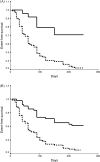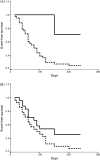Self-assessment of health status is associated with inflammatory activation and predicts long-term outcomes in chronic heart failure - PubMed (original) (raw)
Self-assessment of health status is associated with inflammatory activation and predicts long-term outcomes in chronic heart failure
John T Parissis et al. Eur J Heart Fail. 2009 Feb.
Abstract
Aims: Clinicians lack a generally accepted means for health status assessment in chronic heart failure (CHF). We investigated the correlation between health status and inflammation burden as well as its long-term prognostic value in CHF outpatients.
Methods and results: Kansas City Cardiomyopathy Questionnaires (KCCQ) were completed by 137 CHF outpatients (aged 64+/-12 years, mean ejection fraction 27+/-7%). Inflammatory markers [interleukin (IL)-6, IL-10, TNF-alpha, soluble Fas, Fas ligand, ICAM-1, VCAM-1], plasma B-type natriuretic peptide (BNP), 6 min walk test (6MWT), Zung self-rating depression scale, and Beck Depression Inventory were also assessed. Patients were followed for major cardiovascular events (death or hospitalization for disease progression) for up to 250 days. Patients with worse KCCQ-summary (KCCQ-s<50) score had lower 6MWT (P<0.05), and higher BNP (P<0.05) and pro-inflammatory markers (P<0.05) than those with KCCQ-s>or=50. Worse health status was also associated with shorter event-free survival (115+/-12 days for KCCQ-s<50 vs. 214+/-15 days for KCCQ-s>or=50, P=0.0179). Separating patients according KCCQ-functional score (KCCQ-f, cut-off 50) showed similar results. In multivariate Cox regression analysis, only LVEF (HR=0.637, 95% CI 0.450-0.900, P=0.011) and KCCQ-f (HR=0.035, 95% CI 0.002-0.824, P=0.037) were independent predictors of event-free survival at 250 days.
Conclusion: KCCQ-s reflects neurohormonal and inflammatory burden in CHF. Among studied questionnaires, only KCCQ-f is an independent predictor of long-term event-free survival in CHF.
Figures
Figure 1
Kaplan–Meier curves for event-free survival according to Kansas City Cardiomyopathy Questionnaire score. Panel A: Kansas City Cardiomyopathy Questionnaire-summary; Panel B: Kansas City Cardiomyopathy Questionnaire-functional; solid line: score ≥50; dotted line: score <50.
Figure 2
Kaplan–Meier curves for event-free survival in a subpopulation of 56 patients; Panel A, according to Kansas City Cardiomyopathy Questionnaire-summary score (solid line: score ≥50; dotted line: score <50); Panel B: according to Minnesota Living with Heart Failure Questionnaire score (solid line: lower 50% percentile; dotted line: upper 50% percentile).
Similar articles
- Clinical and prognostic implications of self-rating depression scales and plasma B-type natriuretic peptide in hospitalised patients with chronic heart failure.
Parissis JT, Nikolaou M, Farmakis D, Bistola V, Paraskevaidis IA, Adamopoulos S, Filippatos G, Kremastinos DT. Parissis JT, et al. Heart. 2008 May;94(5):585-9. doi: 10.1136/hrt.2007.117390. Epub 2007 Aug 29. Heart. 2008. PMID: 17761502 - Clinical and neurohormonal correlates and prognostic value of serum prolactin levels in patients with chronic heart failure.
Parissis JT, Farmakis D, Fountoulaki K, Rigas A, Nikolaou M, Paraskevaidis IA, Bistola V, Venetsanou K, Ikonomidis I, Anastasiou-Nana M, Kremastinos DT, Filippatos G. Parissis JT, et al. Eur J Heart Fail. 2013 Oct;15(10):1122-30. doi: 10.1093/eurjhf/hft070. Epub 2013 May 2. Eur J Heart Fail. 2013. PMID: 23639781 - Effects of SGLT2 inhibitors on cardiac function and health status in chronic heart failure: a systematic review and meta-analysis.
Chen J, Jiang C, Guo M, Zeng Y, Jiang Z, Zhang D, Tu M, Tan X, Yan P, Xu X, Long Y, Xu Y. Chen J, et al. Cardiovasc Diabetol. 2024 Jan 3;23(1):2. doi: 10.1186/s12933-023-02042-9. Cardiovasc Diabetol. 2024. PMID: 38172861 Free PMC article. - Effects of levosimendan on quality of life and emotional stress in advanced heart failure patients.
Parissis JT, Papadopoulos C, Nikolaou M, Bistola V, Farmakis D, Paraskevaidis I, Filippatos G, Kremastinos D. Parissis JT, et al. Cardiovasc Drugs Ther. 2007 Aug;21(4):263-8. doi: 10.1007/s10557-007-6034-2. Cardiovasc Drugs Ther. 2007. PMID: 17610056 Clinical Trial. - Health status identifies heart failure outpatients at risk for hospitalization or death.
Heidenreich PA, Spertus JA, Jones PG, Weintraub WS, Rumsfeld JS, Rathore SS, Peterson ED, Masoudi FA, Krumholz HM, Havranek EP, Conard MW, Williams RE; Cardiovascular Outcomes Research Consortium. Heidenreich PA, et al. J Am Coll Cardiol. 2006 Feb 21;47(4):752-6. doi: 10.1016/j.jacc.2005.11.021. Epub 2006 Jan 26. J Am Coll Cardiol. 2006. PMID: 16487840
Cited by
- Hypothalamic dysfunction in heart failure: pathogenetic mechanisms and therapeutic implications.
Rigas A, Farmakis D, Papingiotis G, Bakosis G, Parissis J. Rigas A, et al. Heart Fail Rev. 2018 Jan;23(1):55-61. doi: 10.1007/s10741-017-9659-7. Heart Fail Rev. 2018. PMID: 29052045 Review. - A European multinational cost-effectiveness analysis of empagliflozin in heart failure with reduced ejection fraction.
Tafazzoli A, Reifsnider OS, Bellanca L, Ishak J, Carrasco M, Rakonczai P, Stargardter M, Linden S. Tafazzoli A, et al. Eur J Health Econ. 2023 Dec;24(9):1441-1454. doi: 10.1007/s10198-022-01555-6. Epub 2022 Dec 4. Eur J Health Econ. 2023. PMID: 36463524 Free PMC article. - Depressive symptoms, health-related quality of life, and cardiac event-free survival in patients with heart failure: a mediation analysis.
Lee KS, Lennie TA, Wu JR, Biddle MJ, Moser DK. Lee KS, et al. Qual Life Res. 2014 Aug;23(6):1869-76. doi: 10.1007/s11136-014-0636-5. Epub 2014 Feb 1. Qual Life Res. 2014. PMID: 24488573 - Kansas City Cardiomyopathy Questionnaire Score Is Associated With Incident Heart Failure Hospitalization in Patients With Chronic Kidney Disease Without Previously Diagnosed Heart Failure: Chronic Renal Insufficiency Cohort Study.
Mishra RK, Yang W, Roy J, Anderson AH, Bansal N, Chen J, DeFilippi C, Delafontaine P, Feldman HI, Kallem R, Kusek JW, Lora CM, Rosas SE, Go AS, Shlipak MG; CRIC Study Investigators. Mishra RK, et al. Circ Heart Fail. 2015 Jul;8(4):702-8. doi: 10.1161/CIRCHEARTFAILURE.115.002097. Epub 2015 May 18. Circ Heart Fail. 2015. PMID: 25985796 Free PMC article. - Tai Chi exercise and functional electrical stimulation of lower limb muscles for rehabilitation in older adults with chronic systolic heart failure: a non-randomized clinical trial.
Hao Y, Zhang L, Zhang Z, Chen L, He N, Zhu S. Hao Y, et al. Braz J Med Biol Res. 2019 Nov 25;52(12):e8786. doi: 10.1590/1414-431X20198786. eCollection 2019. Braz J Med Biol Res. 2019. PMID: 31778439 Free PMC article. Clinical Trial.
References
- Hunt SA, Abraham WT, Chin MH, Feldman AM, Francis GS, Ganiats TG, Jessup M, Konstam MA, Mancini DM, Michl K, Oates JA, Rahko PS, Silver MA, Stevenson LW, Yancy CW, Antman EM, Smith SC, Jr, Adams CD, Anderson JL, Faxon DP, Fuster V, Halperin JL, Hiratzka LF, Jacobs AK, Nishimura R, Ornato JP, Page RL, Riegel B ACC/AHA 2005 guideline update for the diagnosis management of chronic heart failure in the adult. A report of the American College of Cardiology/American Heart Association Task Force on Practice Guidelines (Committee to Update the 2001 Guidelines for the Evaluation and Management of Heart Failure) J Am Coll Cardiol. 2005;46:1116–1143. - PubMed
- Bonow RO, Bennett S, Casey D, Ganiats T, Hlatky M, Konstam M, Lambrew C, Normand S, Piña I, Radford M, Smith A, Stevenson L ACC/AHA Clinical performance measures for adults with chronic heart failure. A report of the American College of Cardiology/American Heart Association Task Force on Performance Measures (Writing Committee to Develop Heart Failure Clinical Performance Measures) J Am Coll Cardiol. 2005;46:1144–1178. - PubMed
- Guyatt GH, Nogradi S, Halcrow S, Singer J, Sullivan MJ, Fallen EL. Development and testing of a new measure of health status for clinical trials in heart failure. J Gen Intern Med. 1989;4:101–107. - PubMed
- Rector T, Kubo S, Cohn J. Patient’s self-assessment of their congestive heart failure. Part 2: content, reliability and validity of a new measure, the Minnesota Living with Heart Failure Questionnaire. Heart Failure. 1987;3:198–209.
- Rodríguez-Artalejo F, Guallar-Castillón P, Pascual CR, Otero CM, Montes AO, García AN, Conthe P, Chiva MO, Banegas JR, Herrera MC. Health-related quality of life as a predictor of hospital readmission and death among patients with heart failure. Arch Intern Med. 2005;165:1274–1279. - PubMed
MeSH terms
Substances
LinkOut - more resources
Full Text Sources
Medical
Research Materials
Miscellaneous

